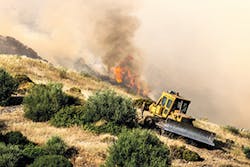We’re barely halfway through the fire season here in California and tragically, as I write this, there have already been six fatalities from fighting the wildfires. It’s shaping up to be the worst fire season in the history of the state both in terms of the amount of land burned and loss of life.
One of the main tools being used to battle these monstrous blazes is dozers. Local fire departments up to county and state departments, and even federal agencies like the US Forest Service and the Bureau of Land Management, all have their own fleets and operators on staff to run the heavy equipment. But when the wildfire grows beyond the scope of their resources, private contractors are hired to bring in their own iron and start fighting flames.
One was 81-year-old Don Ray Smith. Smith was on the Carr Fire in Redding, CA, which (so far) has scorched close to 219,000 acres and is roughly 75% contained. While operating his dozer on July 26, he was overcome by flames and was fatally burned.
Cal Fire lost one its own when 36-year-old Braden Varney, a firefighter/dozer operator was working on the Ferguson Fire near Yosemite. His dozer lost footing and tumbled down steep terrain. Varney leaves behind a wife and two young children.
Investigations into the cause of each wildfire death are currently ongoing. Fire officials take the results of these probes very seriously as they help prevent future tragedies and, in the case of contracting would-be dozer operators, make sure they know what is needed for safe and effective operation in such treacherous conditions. As that bar continues to be raised, contracted dozer operators will keep working to qualify for firefighting duty knowing full well the danger involved when called upon.
Not too long ago I asked, in my Grading and Excavation Contractor Editor’s Blog, what motivates an independent contractor to try to beat back walls of fire. Is it money? Is it the adrenaline rush? Is it a sense of duty?
Clint Ormond of Utah was kind enough to send me an answer.
“You asked why an operator would be compelled to tackle the risks of fighting a fire when it is not their job. I know in our rural area it is out of a sense of community and a desire to help our neighbors. The small town of Grouse Creek in northwest Utah was endangered by a fire that reached 125,000 plus acres in the last two weeks. The federal firefighters eventually took over, but for the worst/fastest spreading part of the fire…it was fought by local, mostly volunteer fire departments; farmers; ranchers; and county employees. They not only used bulldozers and road graders but also used farm tractors with disks
to cut fire lines to slow the fire and try to protect farms and ranches.
“None of these men do it for money because most of them are missing work to do a job they don’t get paid much to do. They don’t do it for recognition because very few people even know that they are there. They don’t do it for adrenaline, because after the first couple hours that wears off. They do it because their friends, family, neighbors, and sometimes they themselves, live in the path of the fire. Men like that cannot sit by and watch the destruction, waiting for the government to save the day. They are compelled to do everything in their power to help because they would not be able to look at themselves in the mirror if they did any less.”
Thank you, Clint, you nailed it. Your words stand as a tribute to the operators and firefighters who have lost their lives protecting communities, property, and the environment as well as to those who continue the effort. Their levels of skill, courage, and selflessness are qualities we all should aspire to reach and make me prouder and more grateful than ever for the fine work you do.
